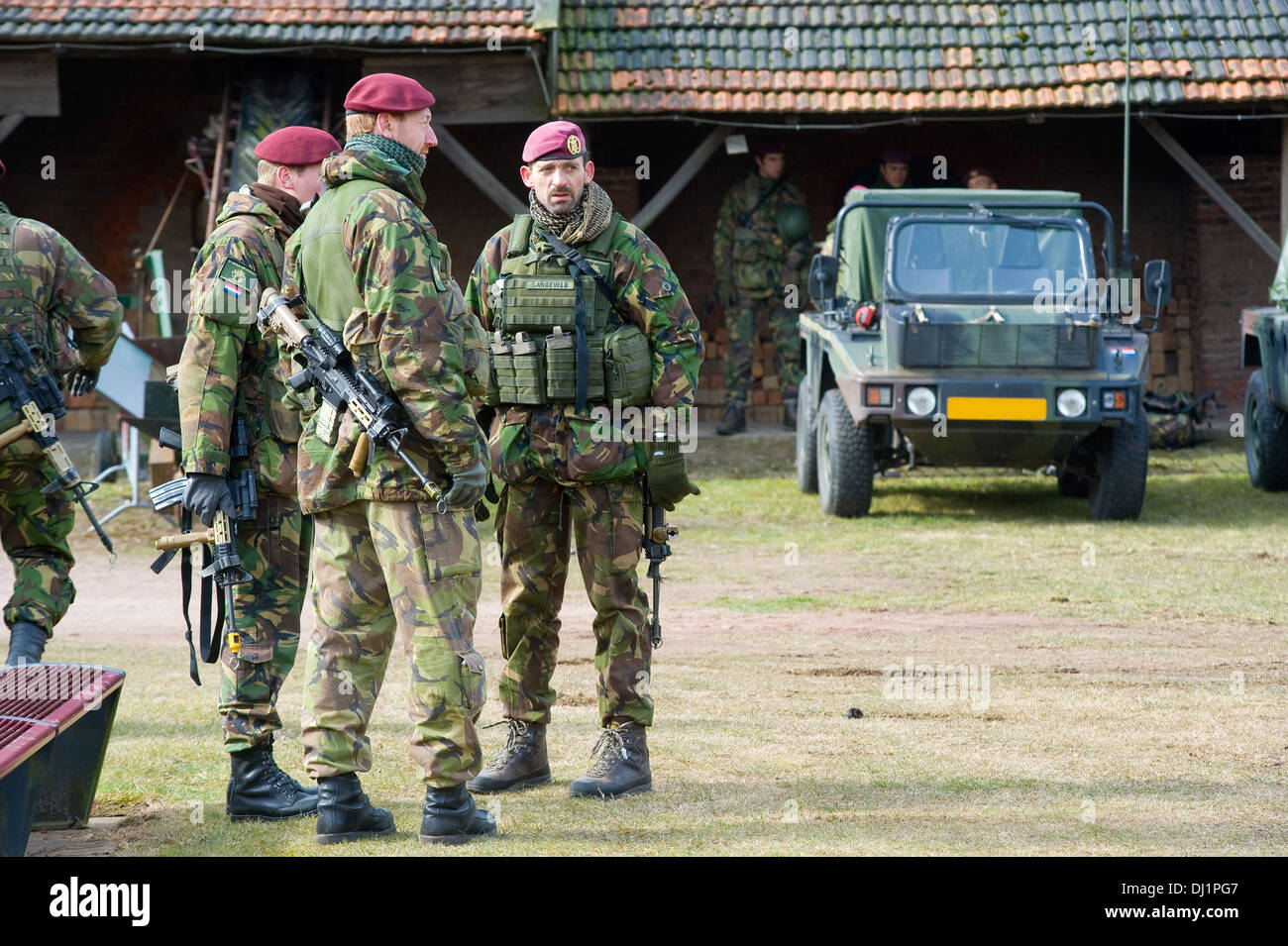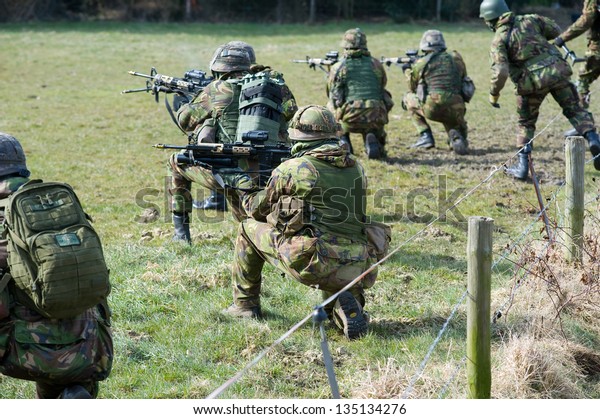Dutch Special Forces - A Look At Quiet Strength
Have you ever stopped to ponder what really shapes a nation's most capable military units, the ones who work in the shadows, quietly getting things done? It’s often more than just training or equipment; there's a deep-seated history, a way of thinking, and a national character that seems to flow through generations. This is certainly true when we consider the elite groups from the Netherlands, whose operations, while not always in the public eye, are built on a foundation of unique experiences and a distinct heritage. You might find it fascinating, really, to see how old stories connect to current capabilities.
When you think about a country like the Netherlands, with its long and sometimes rather complex past, you start to see how certain traits might become deeply ingrained. From managing vast trading networks across oceans to making tough choices during times of great upheaval, like when they had to decide whether to accept Napoleon's brother Louis as their king or face outright annexation, these moments speak volumes. Such historical moments, you know, show a people who weigh their options carefully, who are quite strategic, and who are willing to make hard calls for the greater good of their land and people.
This historical backdrop, with its moments of great strategic thinking and resilience, provides a pretty interesting lens through which to view the qualities that might be present in their modern-day special operations groups. It’s almost like the echoes of past decisions and triumphs subtly shape the kind of individuals who volunteer for these demanding roles. The quiet determination, the ability to punch well above their perceived weight, and the knack for managing difficult situations when others might struggle – these are, in some respects, qualities that have been part of the Dutch story for a long, long time, as a matter of fact.
- T%C3%BCrk I%C5%9Ffa Sotwe
- Alex Honnold Siblings
- Yiff
- Patrick Mahomes Heritage
- Martin Scorsese Man%C5%BEelka
Table of Contents
- What Makes a Nation's Elite Units Stand Out?
- How Did the Dutch Get Their Name?
- A Legacy of Strategic Thinking - The Dutch Approach
- Why Does History Matter for Modern Forces?
- Facing Challenges - The Spirit Behind Dutch Special Forces
- What Qualities Define Such Elite Groups?
What Makes a Nation's Elite Units Stand Out?
When we think about special operations groups from any country, we often picture individuals who are highly skilled and capable, performing tasks that require immense courage and sharp minds. But what really sets one nation's elite apart from another? It could be the unique challenges their country has faced, or perhaps the way their people have historically responded to pressure. For the Netherlands, a place that has seen its share of ups and downs, including periods where it was known as the Koninkrijk Holland under the First Empire back in 1806, there’s a distinct thread of resilience and cleverness that runs through its past, you know. This kind of historical background, which includes periods of both independence and integration, might just shape the very character of those who step up for the most demanding roles in their armed services, really.
The Historical Echoes of Dutch Special Forces
Consider the Dutch Golden Age, a time when the Dutch, more or less, were punching well above their perceived weight on the global stage. They were, in fact, managing their affairs with considerable skill while other nations were, well, a bit of a mess, with England torn by internal struggles. This period wasn't just about trade; it was about smart decisions, careful planning, and a certain kind of practical cleverness that allowed them to flourish. These are, arguably, the same sorts of attributes you'd expect to find in the individuals who make up modern Dutch special forces – people who can think on their feet, act with purpose, and achieve their goals even when the odds seem stacked against them. It’s almost as if the historical spirit of their ancestors, those who made the Dutch Republic a force to be reckoned with, lives on in the quiet determination of today’s operators.
How Did the Dutch Get Their Name?
It's interesting, isn't it, how names come about? You might wonder why, in English, we say "Dutch" instead of "Netherlander" or "Hollander" when talking about people from the Netherlands. The language itself has a story, you see. The term "Deutsch" or "German" became the name for people from Germany, and "Dutch," which actually came from "Deutsch," became the common way to refer to people from the Netherlands. This linguistic connection points to a shared ancestry with the German people, but over time, their paths diverged, creating a distinct identity. This subtle difference in naming, which some find a bit puzzling, actually speaks to a unique historical journey, one that has shaped a distinct culture and, perhaps, the specific qualities found within groups like the Dutch special forces, as a matter of fact.
A Legacy of Strategic Thinking - The Dutch Approach
The history of the Netherlands is full of moments where strategic thinking was absolutely key to their survival and prosperity. Think about their past names: The Dutch Republic, The United State of Belgium, The Kingdom of Hollande. Each name tells a story of shifting alliances, political maneuvering, and a people who, quite literally, had to manage their land and their place in the world with great care. When Napoleon offered them the choice to either accept his brother Louis as king or face annexation, they picked the former after a lot of careful thought. This kind of pragmatic decision-making, where long-term consequences are weighed and difficult choices are made for the sake of the nation, is a pretty strong indicator of a deeply ingrained strategic mindset. This approach, which emphasizes careful planning and foresight, would certainly be a core element for any effective unit, including, of course, the Dutch special forces.
Lessons from the Past for Dutch Special Forces
The ability to manage their affairs so well, even when other nations were in disarray, speaks volumes about the Dutch character. They had a knack for organization and for making things work, even in challenging circumstances. This isn't just about grand political decisions; it's about the day-to-day choices that add up to a nation's strength. These historical lessons, where adaptability and cleverness were often the keys to success, are, in some respects, the very foundations upon which modern elite units are built. The individuals who serve in the Dutch special forces would, you could say, embody these long-standing national traits, applying them to the very specific and demanding situations they face today. It’s a quiet strength, really, born from centuries of practical experience and thoughtful action.
Why Does History Matter for Modern Forces?
You might wonder why we're spending so much time looking back at old maps and historical events when the topic is about modern elite military groups. Well, history isn't just a collection of dusty facts; it's a living narrative that shapes a nation's identity, its values, and even the way its people approach challenges. For a country like the Netherlands, whose history includes significant periods of global trade and colonial presence, like the VOC era, there's a deep well of experience in dealing with far-flung issues and unexpected conflicts. This background, which involved a lot of intermarrying during the VOC period, creating descendants known as Indo, gives a particular flavor to their story. It suggests a people who are used to operating in varied environments and dealing with diverse situations, which is, honestly, a pretty important quality for any special operations unit, including the Dutch special forces.
Facing Challenges - The Spirit Behind Dutch Special Forces
The historical record shows the Dutch have faced some truly tough situations. Take, for example, the rather underappreciated conflict between the Dutch and Koxinga in Taiwan in 1661. The question of why there was no reinforcement from Batavia VOC or the Dutch government during that war highlights the kind of isolated, high-stakes situations that sometimes arose. This sort of experience, where units might have to rely solely on their own resources and ingenuity, could easily instill a deep sense of self-reliance and the need for independent action. This spirit of facing adversity head-on, often without immediate outside help, is, in a way, a defining characteristic that would certainly be present in the individuals who serve in the Dutch special forces, who, by their very nature, operate in demanding and often solitary circumstances.
Quiet Operations of Dutch Special Forces
The quiet operations carried out by elite units require a specific kind of mental toughness and a strong sense of purpose. It’s not about grand gestures or public displays; it’s about getting the job done with precision and often without fanfare. This aligns, rather well, with a historical tendency for the Dutch to manage their affairs effectively and with a certain understated competence. Whether it was the Dutch society for women's interests and equal citizenship, where someone like Jane was a member, working for change in the second half of the 1930s, or the actions of their military, there's a consistent theme of focused effort. This focus on doing what needs to be done, quietly and effectively, is, you know, a pretty fundamental part of what makes the Dutch special forces so capable in their very particular roles.
What Qualities Define Such Elite Groups?
So, if we consider all these historical threads, what specific qualities might we expect to find in the individuals who make up the Dutch special forces? It’s not just about physical strength, though that’s certainly part of it. It’s about a mental fortitude, a kind of calm determination that allows them to make clear decisions under immense pressure. It's also about adaptability, the ability to operate in diverse environments and respond to unexpected turns of events, much like their ancestors had to do when managing global trade or dealing with distant conflicts. This blend of resilience, strategic thinking, and a quiet, practical approach to problem-solving is, arguably, what truly sets them apart, as a matter of fact.
The Enduring Spirit of Dutch Special Forces
The enduring spirit of the Dutch special forces is, you could say, a reflection of their nation's long and varied story. From the days of the Dutch Republic to the choices made under the First Empire, and through periods of colonial engagement and internal development, the people of the Netherlands have shown a consistent ability to face challenges with a pragmatic and often understated strength. This deep historical well of experience, combined with a modern approach to training and readiness, creates a unique foundation for their elite units. They represent, in a very real sense, the continuation of a tradition of competence and quiet effectiveness, standing ready to act when called upon, always with that distinct Dutch character, basically.
This article has explored the historical and cultural underpinnings that might contribute to the character and effectiveness of Dutch special forces. We looked at the origins of the name "Dutch," the strategic decisions made during various historical periods, including the Napoleonic era and the VOC period, and how these experiences could shape a nation's elite military units. The discussion highlighted how a legacy of careful management, resilience in the face of challenges, and a pragmatic approach to difficult situations might inform the qualities found in these specialized groups.
- What Color Is Squidward
- Cassie Del Isla
- How Many Nose Surgeries Did Michael Jackson Have
- Cristal Couture Dress To Impress
- What Does Faafo Mean

Dutch army hi-res stock photography and images - Alamy

Dutch Special Forces During Training Stock Photo (Edit Now) 135134276

Special Forces News | Sondereinsatzkräfte, Kampfschwimmer, Soldat